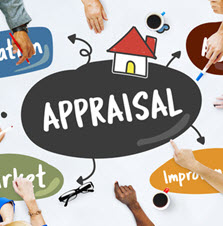As a homeowner, you might feel like the insurance company has the upper hand when it comes to replacing or repairing your damaged property. But it’s important to understand that you have options if you aren’t satisfied with the amount your insurer offers to settle a claim. One of those options is the appraisal process.
Most homeowner insurance policies include an appraisal provision, which is an alternative dispute resolution process that resolves specific issues regarding the amount of loss. In other words, appraisal will determine how much you should be compensated for your damaged piano, rare books or other property.
Appraisal is distinct from other types of ADR (like arbitration) because it is limited to a specific loss. It is designed to be a simple and inexpensive way of determining how much an insurer owes you for a particular piece of property.
How Does the Appraisal Process Work?
If a policyholder and insurance company can’t agree on the value of the loss, either can demand that the damages be determined by appraisal. Here is how the process works:
- Both the policyholder and the insurer will hire an independent appraiser.
- Together, the two appraisers will choose an umpire, who acts like an arbitrator (essentially the judge). The umpire will resolve any disagreements that arise between the appraisers. The two independent appraisers and the umpire comprise the appraisal panel.
- The two appraisers will then examine the documents and estimations and try to reach an agreement on how much the repair or replacement should cost.
- If the appraisers can’t agree on specific items then they will submit their differences to the umpire.
- Once the panel comes to an agreement they will sign a binding appraisal award. The insurer will pay that amount to the policyholder.
Other Things You Should Know About the Appraisal Process
The request for appraisal must be made in writing and should be sent by certified mail. Take note of the time limit set forth in your homeowner’s insurance policy. This will specify when appraisal can take place.
While the policyholder can choose his or her own independent appraiser, it’s a good idea to choose someone with experience handling the damaged property at issue. An expert appraiser will know how to make a detailed estimate of how much it will cost to repair or replace something. An experienced attorney can help you choose a qualified independent appraiser.
Each party’s appraiser can advocate for their respective selecting parties and in doing so, does not violate the impartiality requirement by acting as an advocate for the person who hired them. That said, an appraiser must always act fairly and in good faith, without any bias and without any personal financial interest benefiting the party that hired them.
Is My Dispute Eligible for Appraisal?
If your dispute concerns the cost of repair and how much your property is worth, then yes, it is eligible for appraisal. But if your insurance company denies your claim entirely then that raises a coverage dispute AND not a cost dispute and it is therefore not eligible for an appraisal. The appraisal panel also will not resolve, among other issues:
- Fault,
- Coverage limit,
- Scope of coverage,
- Deductible questions, or
- If anything has already been paid on the claim.
Danger of electing an Appraisal?
While a homeowner should be aware of the appraisal process, at the same time the homeowner should know that by electing that process, it can often be more harmful then helpful. By electing appraisal, once an umpire rules on your matter, no matter how unfavorable or unjust their decision is, it is the final word in your matter. However, if your matter was mediated or litigated in the courts, you are provided greater negotiation opportunities as well as the opportunity to not accept an offer or even set aside a bad ruling. Additionally, Florida Insurance Law was drafted to provide many protections to the homeowner. One such protection is that it places the cost of your attorney fees on to the insurance company. However, if you elect the appraisal process, then both sides bear the cost of the appraisal process.
So, unless you need to resolve your situation quickly, there are more risk to the homeowner than there is benefit in going down the path of appraisal – which is why insurance companies prefer the appraisal process, as it is typically more advantageous to their objectives then to the homeowner.
Reach Out to Us Today for Assistance
It’s important that you understand the terms of your homeowner’s insurance policy so that you know your rights and obligations under Florida law, including the appraisal process. If you feel that the insurance company is paying you too little for your damages and you want to know if the appraisal process is the best option for your unique situation, then contact the Insurance Litigation Group with experience based on years in public adjusting and courtroom litigation, the attorneys at the Insurance Litigation Group will analyze your case and will help you determine if the appraisal process is in your best interest in achieving maximum recovery on your claim. Contact us today for a free consultation.
Resource:
leg.state.fl.us/statutes/index.cfm?App_mode=Display_Statute&Search_String=&URL=0600-0699/0627/Sections/0627.7015.html






